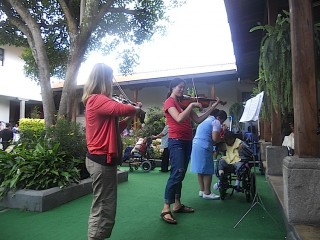Title

Caeli Smith and Caterina Longhi perform in Antigua, Guatemala.
Project: Rayos de Canción: teaching dance, drama, and music to children in grades four through six for four hours each morning
Place: Antigua, Guatemala
Dates: May 28-June 1
Juilliard Participants: New graduates Ian Sullivan (percussion), Annalise Thompson (dance), and Matt Wright (flute); current students Danny Hernandez and Kerry Warren (both drama), Caterina Longhi (viola), Magdalyn Segale (dance), and Caeli Smith (violin)
Body
On leaving New York for Guatemala, what we were most worried about—aside from the language barrier (only two of us speak Spanish)—was that we simply had no idea how the children would take to lessons in dance, drama, and music. Our biggest task would be to figure them out and teach them quickly enough to be able to step aside on the fifth day for their performance. We’d spent weeks preparing lesson plans but anticipated needing to change them on the spot.
As it turned out, our vague notions of how the children would learn were not entirely accurate. The music teachers quickly discovered that the children responded best to having one teacher. As the musicians had imagined co-teaching all their lessons, their major challenge proved to be the process of assigning just one teacher to the bulk of the lesson. They were thrown another curveball when the simplest lessons they had planned turned out to be too advanced. But by distilling the focus to one three-line song for the entirety of the week, the children did indeed gain basic music skills.
For dance and drama, the challenges were revealed in the behavior of the students, with the fourth grade the most difficult to control. Interestingly, the Spanish speakers teaching dance and drama had a tougher time controlling the fourth graders than the music teachers, who don’t speak Spanish. There is something to be said for getting a class’s attention through mime as opposed to verbal requests!
For the dance teachers, the biggest surprise was that we hadn’t expected the children to be so autonomous: they took incredible responsibility upon themselves to remember their sequences and hold each other accountable to ensure the high quality of their performance. They gobbled up the chance to freely express themselves physically, and their confidence grew steadily throughout the week. Looking back, these skills could have been coming straight from their other classes. They were directed to organize themselves to collectively tell a story in their drama lessons, which develop their teamwork and accountability skills. We hadn’t anticipated that our combination of lesson plans would facilitate this amazing discovery: the more space, autonomy, and freedom of choice students are given, the faster they grow.
Another example is of their autonomy is that, unprompted, the kids decided to make their own costumes. The funniest moment of the week was seeing the sixth graders all lined up as warriors holding homemade shields with abs drawn on the stomachs.
The primary school is comprised of kindergarten through third grade classes with 30 to 40 students each, and when it came time for the final performance, they gathered with all their teachers in the front half of the new multipurpose room, leaving the back half of the room as the stage for grades four through six. No U.S. fire code would have allowed that many people in the same space! Despite only four days of introductions and rehearsals, it was delightful to watch their adrenaline kick in that last day to help make things run smoothly—and there was an excitement sparked as the children shared their work with their classroom teachers, peers, and principal. Even though we wanted to watch the whole performance, we took turns staying outside to keep the grades that weren’t performing quiet.
At the end of the performance, the principal acknowledged our work and then pulled out his guitar and played a beautiful Guatemalan folk song followed by a couple more that the students requested. Our departure that day was bittersweet as we won’t be seeing all the same students next year. But we remain inspired by their willingness to be taught, spurred by the success our program and hungry for more cultural exchange.




